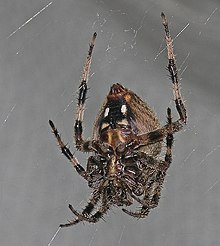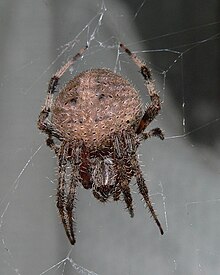| Neoscona crucifera | |
|---|---|

| |
| Ventral view | |

| |
Dorsal view | |
| Scientific classification | |
| Domain: | Eukaryota |
| Kingdom: | Animalia |
| Phylum: | Arthropoda |
| Subphylum: | Chelicerata |
| Class: | Arachnida |
| Order: | Araneae |
| Infraorder: | Araneomorphae |
| Family: | Araneidae |
| Genus: | Neoscona |
| Species: | N. crucifera |
| Binomial name | |
| Neoscona crucifera (Lucas, 1839) | |
Neoscona crucifera is an orb-weaver spider in the family Araneidae. It is found in the United States from Maine to Florida in the east, to Minnesota in the Midwest, to Arizona in the southwest, southern California coastal communities and in Mexico. Its common names include Hentz orbweaver (after Nicholas Marcellus Hentz), spotted orbweaver, and barn spider. The name "barn spider" is also commonly used for a different spider, Araneus cavaticus.
Generally nocturnal, females may become diurnal in the fall. Females are about 9.5–19 millimeters (0.37–0.75 in) long, while males are somewhat smaller. The upper surface of the abdomen is brown and hairy. The legs display alternating light and dark brown bands. The undersurface of the abdomen is black, with two white spots.
This species is relatively variable in color and sometimes pattern, but is most commonly seen sporting a rusty-red or golden orange color. The orb-shaped web is very large and is often constructed on buildings and other man-made structures, often several feet above ground, especially near outdoor lights. This species is most conspicuous in late summer and early fall.
The orb part of the web may be nearly 2 feet (0.61 m) in diameter. The eggsac consists of fluffy yellow threads in a rolled leaf over a lenticular or spherical egg mass 5–12 mm (0.20–0.47 in) in diameter, which may contain up to 1,000 eggs. Juveniles are frequently preyed upon by mud daubers. This species will bite if provoked, but its venom is not dangerous to humans.
Synonyms
Neoscona crucifera has also been known by a number of taxonomic synonyms.
- Aranea crucifera albimaculata Strand, 1908
- Epeira crucifera Keyserling, 1864
- Epeira domiciliorum Emerton, 1884
- Epeira hentzii Keyserling 1864
- Epeira lentiginosa Blackwall 1862
- Neoscona arkansa Chamberlin & Ivie, 1942
- Neoscona benjamina Comstock 1940
- Neoscona hentzi Kaston 1977
- Neoscona nebraskensis Chamberlin & Ivie, 1942
- Neoscona sacra Chamberlin & Ivie, 1944
References
- ^ "Hentz's orbweaver". University of Arkansas. Archived from the original on June 18, 2010. Retrieved September 11, 2010.
- ^ "Neoscona crucifera". Zipcode Zoo. Archived from the original on August 20, 2012. Retrieved September 11, 2010.
- G. B. Edwards, Florida Department of Agriculture and Consumer Services, Division of Plant Industry. "Orb Weavers". Retrieved September 11, 2010.
{{cite web}}: CS1 maint: multiple names: authors list (link) - "Neoscona crucifera (Hentz Orb-weaver) - Spider Identification & Pictures". Retrieved July 21, 2015.
- B. J. Kaston (1976). "Supplement to the Spiders of Connecticut" (PDF). Journal of Arachnology. 4 (1): 1–72.
- B. J. Kaston (1948). "Spiders of Connecticut". Bulletin of the Connecticut State Geological and Natural History Survey. 70: 1–874.
- "Spotted Orbweavers Neoscona spp.". Missouri Department of Conservation. Retrieved 16 September 2022.


